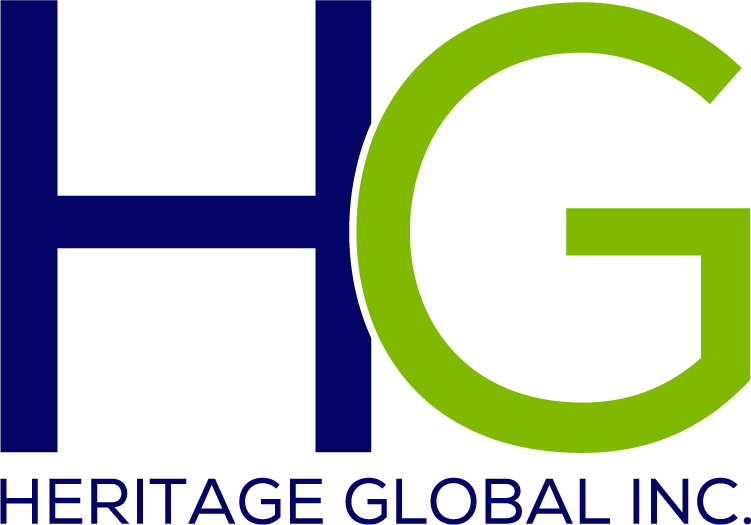To provide innovative financial and industrial asset solutions to continue facilitating the transition from a linear to a circular economy. Aiming for increased monetization and decreased environmental impact.
Asset Conversion with Purpose
OUR MISSION IS CLEAR
The HG ESG Program Centers on
Three Main Drivers
Heritage Global Inc. and its subsidiaries, firmly uphold the highest standards of integrity and ethical behavior in its dealings with employees, clients, buyers, suppliers, shareholders and the public. In 2023, we collaborated with an independent third party firm to perform a comprehensive Environmental Social Governance (ESG) Materiality Assessment of our operations. As part of this assessment, our most pivotal ESG topics were identified as corporate governance, our role in the circular economy, and our commitment to supporting local communities.
Running a Responsible Business
Enabling the Circular Economy
Supporting Communities

Traditional “Linear Economy” has a one-way flow of resources from production to consumption, lacking any form of cyclical reuse or regeneration.
HG has been extending the life of second-hand assets since long before sustainability became mainstream. Our “Circular Economy” reflects our commitment to sustainability, as it works to repair and refurbish assets or put them into an auction loop that facilitates their reuse, repurposing, and recycling; thus keeping them out of landfills. The ethical practices across our supply chain, coupled with a minimized environmental impact, enable us to promote sustainability at every level.

Sustained Environmental Impact: Tracking Our Progress
From 2021 to 2024, we helped save over 124,000 metric tons of greenhouse gas emissions and 93,000 tons of waste from landfills. On average, these account for ~25% of the total assets sold through HGP and ALT.
an additional
6259
recycled instead of landfilled
an additional
43816
recycled instead of landfilled
an additional
10540800
recycled instead of landfilled
Our Impact

Clients
Clients reap the benefits of HG’s Industrial and Financial Asset divisions, which boast over 200 years of experience and data. We leverage our proprietary data to provide tailored solutions that deliver measurable outcomes for our clients. Many corporations are mindful of initial procurement costs, yet lack efficacy in end-of-life disposition and liquidation. Redeeming value from pre-owned assets is a wise financial move as the proceeds could be a considerable contribution to the organization. Our team remains dedicated to utmost transparency throughout every project, while abiding by data security protocols so our clients can trust that their assets will be managed ethically and sustainably. With a standard of excellence that has stood the test of time, we have assisted thousands of companies in overcoming difficult challenges with enduring success.

Buyers
For years, HG has been a go-to source for buyers seeking to access a vast array of specialized industrial and financial assets in an effective, often cost-efficient manner while decreasing their carbon footprint. Buying secondhand yields savings and shortens lead & delivery times. Holding auctions for reputable global corporations provides buyers with the ability to buy locally – resulting in more environmentally sound logistics solutions with positive ecological repercussions. Additionally, debt buyers have received bidding opportunities for distressed asset portfolios from some of the world’s top financial institutions and creditors. Our extensive expertise and dedication to excellence make us stand out from the crowd when it comes to providing top-notch solutions that meet our buyers’ needs.

Planet
The implementation of a reverse supply chain stands to offer numerous environmental benefits. By making good use of existing resources, the need for manufacturing new items is significantly diminished, leading to fewer items being sent to landfills. To ensure sustainability, it is essential to establish proper asset disposition processes such as reselling excess, obsolete assets and surplus goods. Transparency and trust are key in this process as they allow us to develop environmentally-friendly practices throughout the entire cycle. Such ethical practices contribute to short-term and long-term sustainability benefits while allowing us to act responsibly toward our planet and its future.
In 2024, we updated our GHG emissions calculations to reflect a Spend-Based Emissions Factors Approach. This new method, which applies conservatively estimated emission factors to asset sales values, enhances the consistency, transparency, and stakeholder understanding of our environmental impact. Previously, we used a Detailed Emissions Calculation Process. Additionally, waste to landfills is based on conversion factors provided by the Environmental Protection Agency (EPA): 1 metric ton of waste to a landfill generates approximately 1.33 metric tons of CO2e, and 1 metric ton of waste incinerated generates approximately 1 metric ton of CO2e.
